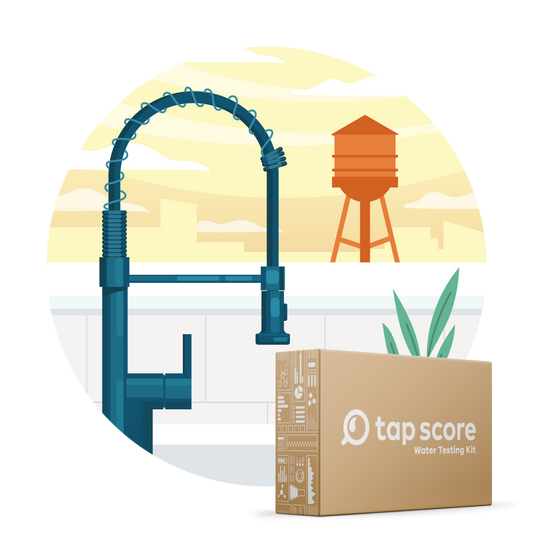
Do I Need a Water Softener?
Our blog is written by real experts— not AI. Each guide is carefully reviewed and updated based on the latest research. Plus, with no affiliate links, you can count on unbiased insights you can trust.
Water softeners come in handy when you've got hard water. If your faucets and clothes are covered in stains and you feel a “scummy” residue on your hands after you wash them with soap, you most likely have hard water.
Water is hard if it has high levels of dissolved calcium and magnesium. Water with more than 120 parts per million (PPM) of calcium or magnesium is considered “hard,” and over 180 PPM is considered “very hard.”[1] A lot of households in the U.S. have hard water which, while not a health concern, can cause a number of problems around the house. There is a relatively easy fix, however: a water softener.
Table of Contents:
- What is a Water Softener?
- 6 Signs You Might Need a Water Softener
- Test Your Water and Consider a Water Softener
- When Should You Buy a Water Softener?
Key Takeaways:
- Water softeners can reduce the negative impacts of hard water on your hair, skin, and plumbing.
- Various indicators, including chalky white buildup on appliances and plumbing fixtures, and stained clothes and glassware can let you know you have hard water.
- Tap Score’s laboratory water testing kits can let you know how hard your water is and test for a wide variety of other water quality parameters and contaminants.
What Is a Water Softener?
Water softeners remove excess calcium and magnesium ions via exchange with sodium or potassium ions — which won’t lead to staining or build up in your pipes.
Water softening systems help increase the lifespan of your plumbing, water heater, and clothes. They can be water guzzlers though, using up to 25 gallons of water per regeneration cycle. The frequency of regeneration depends on your water usage and hardness so it can vary widely from place to place and person to person.
Put this in perspective, the national average water use per capita is about 80-100 gallons per day.[3]
Salt-Based Water Softeners (Ion Exchange) vs Salt-Free Water Conditioners
Salt-based water softeners, also known as ion exchange softeners, address hard water by removing minerals such as calcium and magnesium. As hard water flows through a tank of resin beads coated with sodium or potassium ions, the hardness minerals attach to the beads and are exchanged for sodium or potassium, effectively softening the water. This process prevents scale buildup in plumbing and appliances, minimizes staining on dishes and fixtures, and helps soaps and detergents lather more easily. However, salt-based softeners introduce a small amount of sodium into the finished water if sodium is the exchange ion, which may be a consideration for those on low-sodium diets. Additionally, these systems require periodic regeneration to recharge the resin beads, during which waste brine (high in sodium or potassium) is produced and must be discharged. This can be a problem in areas that have banned salt-based softeners to prevent increased salts in wastewater.
Salt-free conditioners, sometimes called descalers, use a different approach. Instead of removing calcium and magnesium, these systems alter the structure of these minerals through a process called template-assisted crystallization, meaning they are less likely to adhere to pipes and appliances. While scale buildup is reduced, the minerals remain in the water. As a result, salt-free systems do not improve soap lather or eliminate hard water stains on dishes, clothing, or appliances. An added benefit is that salt-free systems do not produce wastewater. These systems are best suited for situations where the main concern is preventing scale on plumbing and appliances, rather than addressing the overall effects of hard water.
| Salt-Based Softeners | Salt-Free Conditioners |
|---|---|
| ● Remove hardness minerals | ● Change the structure of hardness minerals |
| ● Prevent scaling of pipes and appliances | ● Prevent scaling of pipes and appliances |
| ● Prevent staining on fixtures, dishes, and clothes | ● Do not prevent staining on fixtures, dishes, and clothes |
| ● Help soaps/detergents lather more easily | ● Do not help soaps/detergents lather more easily |
| ● Require regeneration (with salt) | ● Require minimal maintenance (no regeneration) |
| ● Produce waste streams (brine discharge) | ● Do not produce waste |
6 Signs You Might Need Water Softener

-
Dry Skin and Tangled Hair
Your skin and hair can take a hard hit when you have hard water. The minerals in your water react with soap to form “soap scum,” a sticky substance that can build up on your skin. Soap scum can block your pores, causing inflammation. Your hair may also feel dry, brittle, and prone to tangles.
-
Scale Buildup on Your Appliances
Mineral deposits, also known as scale, are indicative of hard water. It appears as a hard, chalky substance (made of precipitated calcium and magnesium minerals). Scale can form on the inside of appliances like coffee pots, as well as on faucets, showers and bathtubs. If you already have stubborn deposits, try scrubbing affected areas with a one to one mixture of vinegar and water.
-
Decreased Efficiency and Lifespan of Certain Appliances
When scale builds up in appliances like your water heater or washing machine, reduce the efficiency of the appliance. The buildup of scale can cause lower flows and less efficient heating. In the long run, hard water can also decrease the lifespan of appliances due to the extra wear and tear of working harder to combat the water hardness.
-
Your Glassware is Cloudy
The same scale that builds up in your appliances and on faucets can deposit on your glassware, causing a cloudy, dull appearance. While a water softener is the best way to eliminate the problem altogether, if you do have cloudy glassware, here are two things you can do:
Option 1: Run your glassware through the dishwasher with a solution of ½ cup vinegar and no soap.
Option 2: Soak your glassware in the sink with water and ~1 cup of vinegar.
-
Your Clothes Look Dingy and Faded
While there are many types of water quality-related clothing issues, hard water often results in stiff, gray laundry. Because laundry detergents (especially powdered ones) bind with the calcium and magnesium in hard water, it can be hard to get your clothes looking and feeling clean. There are several ways to combat this:
— Choose liquid detergents rather than powdered ones
— Add ½ cup of laundry borax to each load
— Soak your clothes in 1 cup of white distilled vinegar mixed with 1 gallon of water for 30 minutes. Rinse, then launder.
A water softener is the best way to avoid the problem from the start.
- Plumbing is in Constant Need of Repair
All types of pipes can suffer lowered water pressure with excessive scale build-up. At the extreme, flow can become so restricted that pipes need to be replaced entirely.
Test Your Water and Consider a Water Softener
Look into your water hardness levels with a laboratory test kit:
Tap Score water tests will test your water for water hardness, in addition to many other parameters and potential contaminants. With a personalized water quality report, we will provide you with an unbiased-assessment of water treatment options.
When Should You Buy a Water Softener?
For most cases, water softeners are a personal preference, but we recommend considering one when your water is “very hard,” meaning your water hardness levels are at or above 180 PPM (parts per million or mg/L) or more than 10 GPG (grains per gallon).

What Is GPG or Grains per Gallon?
Grains per gallon (GPG) is a unit of measurement specific to water hardness that refers to the amount of calcium carbonate in a gallon of water. One grain is equal to 0.002 ounces of calcium carbonate dissolved in one gallon of water. Grains per gallon can be easily converted from parts per million (PPM) of calcium carbonate by multiplying PPM as calcium carbonate by 17.1.
Will Water Softeners Remove Iron from My Water?
According to the Water Quality Association (WQA), softeners can be used to remove iron from water with low pH (6.5 and below). Above pH 6.5, iron can foul the softener's resin, so it's best to limit iron concentration to 3 PPM.[5] You can find out your water's iron concentration levels by testing your water.









